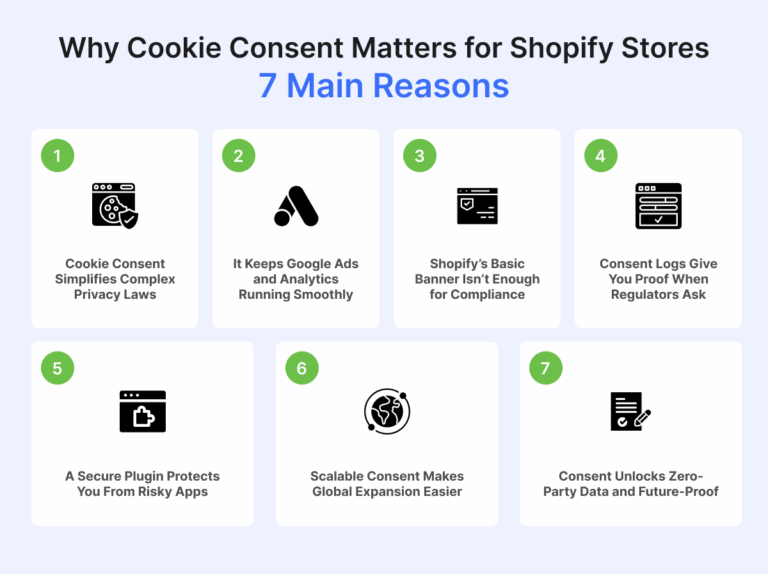Have you ever wondered what would happen if regulators audited your Shopify store tomorrow? With privacy laws tightening globally, merchants cannot afford to leave cookie consent as an afterthought.
By 2026, compliance will not be optional; it will directly determine ad performance, customer trust, and even your ability to operate internationally. Platforms such as Google are changing how tracking works, forcing merchants to adopt Consent Mode v2 to keep their advertising effective. All of this is happening while customers themselves are demanding transparency.
This blog will explore seven main reasons why every Shopify merchant must have a proper cookie consent solution in place before 2026. Each reason is tied to practical business outcomes, compliance, performance, growth, and trust, so you can see why delaying this step puts your store at risk. Continue reading!

Privacy regulations are no longer limited to the EU’s GDPR. In the United States, the California Privacy Rights Act (CPRA) has set strict rules on how businesses collect and share personal data. Other states, including Virginia, Colorado, and Utah, have already introduced their own laws, each with unique consent requirements. In Canada, Quebec’s Law 25 is reshaping expectations around cookie tracking. This patchwork makes compliance a moving target.
Shopify’s default settings cannot adapt to every new law. A cookie consent plugin, however, automatically tailors banners and consent collection to the visitor’s region. This ensures your store remains compliant whether a shopper is from London, Los Angeles, or Montreal. By standardising consent management, merchants avoid costly errors and keep operations legally sound.
In short, cookie plugins are not just about banners. They provide a dynamic compliance layer that adjusts to new regulations without requiring manual intervention from store owners.
By 2026, Google’s Consent Mode v2 will be a requirement for advertisers. Without sending proper consent signals, Shopify merchants risk losing conversion tracking, remarketing audiences, and accurate measurement across Google Ads and Analytics. This could drastically reduce return on ad spend (ROAS) and campaign efficiency.
A cookie plugin integrates directly with Consent Mode v2, ensuring tracking adjusts based on user choices. When a customer declines cookies, Google receives anonymised signals rather than blocking data entirely. This preserves reporting accuracy while maintaining compliance. Merchants relying only on Shopify’s default banner won’t have this functionality.
If advertising fuels your sales, then enabling Consent Mode via a cookie plugin is non-negotiable. It allows you to respect privacy without sacrificing campaign performance.
Shopify provides a Customer Privacy tool with a banner editor, but it has limitations. It displays consent banners, yet it does not enforce prior blocking. This means scripts such as the Meta Pixel, TikTok Ads, or Hotjar can load before a visitor grants permission. Under GDPR, that is a compliance failure.
Cookie plugins solve this by blocking non-essential scripts until explicit user consent is given. They categorise cookies, manage regional preferences, and prevent premature data collection. This closes the gap between legal requirements and Shopify’s native capabilities.
Without a plugin, merchants are left exposed. Regulators can argue that displaying a banner without blocking is misleading, leaving businesses vulnerable to penalties and reputational harm.
Showing a banner is only the first step. Regulators increasingly demand evidence of how and when consent was captured. For example, the UK’s Information Commissioner’s Office (ICO) has stressed that businesses must be able to demonstrate compliance upon request.
Cookie plugins maintain detailed logs of user interactions: timestamps, categories accepted or rejected, and consent history. This creates a verifiable audit trail that protects merchants if regulators investigate or customers dispute data practices. Having these records is not just best practice; it can be the difference between proving compliance and paying fines.
By automating consent storage, plugins save Shopify merchants from manual recordkeeping and provide peace of mind in an uncertain regulatory climate.
Security is often overlooked in the compliance discussion. In 2024, a popular Shopify cookie app called Consentik was reported to have vulnerabilities that exposed sensitive merchant data. Thousands of stores were affected, highlighting the risks of relying on poorly maintained apps.
Choosing a well-supported cookie consent plugin significantly reduces this risk. Established solutions undergo regular audits, receive timely updates, and follow Shopify’s app security guidelines. They not only safeguard compliance but also protect customer data from breaches that could damage trust and invite legal liability.
For merchants, the lesson is clear: not all apps are equal. A reputable, secure cookie plugin is a critical part of your overall risk management strategy.
As your Shopify store grows beyond borders, compliance complexity multiplies. Selling in Europe demands GDPR compliance, while reaching U.S. customers means following CPRA and other state laws. Asia-Pacific markets are also implementing their own frameworks. A one-size-fits-all banner will not meet these diverse expectations.
Cookie plugins provide localisation features such as multi-language support, geotargeted banners, and region-specific consent options. This ensures visitors always see the right message, no matter where they shop from. For Shopify Plus stores with multiple domains, plugins streamline management across all storefronts.
In effect, cookie plugins remove compliance as a barrier to international growth. They allow merchants to scale confidently, knowing customer data practices are adapted to local requirements.
Cookie consent is not just a defensive measure. It is also a gateway to better marketing. As third-party cookies phase out, businesses are shifting toward zero-party data, information customers willingly share, such as preferences or purchase intentions. Consent banners can double as preference centres, where shoppers opt in to tailored experiences.
This data becomes invaluable when combined with AI-driven personalisation. Merchants can build stronger customer profiles and run targeted campaigns, all while maintaining transparency. Rather than limiting marketing, cookie consent creates opportunities for deeper engagement and loyalty.
By investing early, Shopify merchants gain a head start in adapting to a future where privacy and personalisation go hand in hand.
For Shopify merchants, cookie consent is no longer optional. Regulations are expanding, platforms like Google are tightening requirements, and customers are demanding transparency. The seven reasons outlined here, from legal compliance to marketing innovation, make it clear that waiting until 2026 is a costly mistake.
A reliable cookie consent plugin helps you: stay compliant across multiple jurisdictions, protect advertising performance with Consent Mode v2, and safeguard your store’s security and reputation.
Merchants who act now will not only avoid penalties but also position themselves for sustainable growth. Cookie consent is more than a legal checkbox; it is a strategic investment in compliance, trust, and competitive advantage.
Future-proof your business before 2026. Seers AI simplifies cookie consent, protects ad performance, and ensures global compliance, so you can focus on growth, not regulations.
Get Free Shopify PluginIn the UK and EU, Shopify merchants must show a cookie banner when using non-essential cookies (ads, tracking, personalisation). Under GDPR and the ePrivacy Directive, these cookies require opt-in consent before loading. Also, merchants need cookie banners if they use third-party tracking tools or analytics that collect personal data. Shopify’s Customer Privacy settings support automated banners for UK/EEA markets.
Google Consent Mode v2 is Google’s updated system for handling user consent signals across analytics, advertising, and tracking tools. For Shopify stores, it ensures that when users decline certain cookies, Google services send anonymised or restricted signals rather than dropping all data. This helps stores remain compliant while maintaining usable data for attribution and marketing optimisation.
No. Shopify’s native cookie banner and Customer Privacy tool help with EU/UK/EEA region rules, automating some banners and providing region targeting. However, it does not enforce prior blocking of non-essential scripts, doesn’t always integrate with Google Consent Mode v2 fully, and lacks detailed consent log functionality. For full legal protection and tracking accuracy, many merchants use a third-party CMP.
Ignoring cookie consent in the US exposes merchants to fines and legal challenges under state privacy laws like CPRA (California), Virginia’s CDPA, Colorado’s CPA, and others. These laws require transparency, “Do Not Sell/Share” options, and sometimes opt-out or opt-in for tracking. Additionally, non-compliance damages customer trust, may hinder ad targeting, and lead to data breaches if scripts run without control.
Consent log storage involves recording timestamped information about user consent: which categories (e.g. analytics, marketing) were accepted or rejected, date/time, and any changes over time. Merchants should store these logs securely (encrypted, access limited), make them exportable, and review them during privacy audits. Regulators like the ICO expect merchants to produce these logs on demand. Third-party CMPs usually provide this functionality out of the box.
Shopify stores can maintain analytics accuracy by using Consent Mode v2 (which sends non-personalised or cookieless signals when cookies are declined), employing modelling for conversion data, and fallback measurement tools like server-side tracking. Also, segmenting data by consent status helps distinguish between opted-in and opted-out traffic. This layered approach lets you preserve insights even amid strict privacy constraints.


United Kingdom
24 Holborn Viaduct
London, EC1A 2BN
Get our monthly newsletter with insightful blogs and industry news
By clicking “Subcribe” I agree Terms and Conditions

Seers Group © 2026 All Rights Reserved
Terms of use | Privacy policy | Cookie Policy | Sitemap | Do Not Sell or Share My Personal Information.